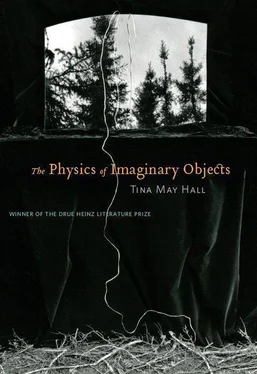Tina Hal - The Physics of Imaginary Objects
Здесь есть возможность читать онлайн «Tina Hal - The Physics of Imaginary Objects» весь текст электронной книги совершенно бесплатно (целиком полную версию без сокращений). В некоторых случаях можно слушать аудио, скачать через торрент в формате fb2 и присутствует краткое содержание. Год выпуска: 2010, Издательство: University of Pittsburgh Press, Жанр: Современная проза, на английском языке. Описание произведения, (предисловие) а так же отзывы посетителей доступны на портале библиотеки ЛибКат.
- Название:The Physics of Imaginary Objects
- Автор:
- Издательство:University of Pittsburgh Press
- Жанр:
- Год:2010
- ISBN:нет данных
- Рейтинг книги:5 / 5. Голосов: 1
-
Избранное:Добавить в избранное
- Отзывы:
-
Ваша оценка:
- 100
- 1
- 2
- 3
- 4
- 5
The Physics of Imaginary Objects: краткое содержание, описание и аннотация
Предлагаем к чтению аннотацию, описание, краткое содержание или предисловие (зависит от того, что написал сам автор книги «The Physics of Imaginary Objects»). Если вы не нашли необходимую информацию о книге — напишите в комментариях, мы постараемся отыскать её.
The Physics of Imaginary Objects,
The Physics of Imaginary Objects — читать онлайн бесплатно полную книгу (весь текст) целиком
Ниже представлен текст книги, разбитый по страницам. Система сохранения места последней прочитанной страницы, позволяет с удобством читать онлайн бесплатно книгу «The Physics of Imaginary Objects», без необходимости каждый раз заново искать на чём Вы остановились. Поставьте закладку, и сможете в любой момент перейти на страницу, на которой закончили чтение.
Интервал:
Закладка:
In severe weather, he is disconcertingly spontaneous, appearing unexpectedly in the middle of a soap opera shootout or a talk show featuring exotic animals. These are intimate moments; his hair is mussed, his shirt untucked. Red patches blush the satellite images as he urges her to take cover and watch for downed trees. She knows exactly what he smells like: Xerox toner and lemons. And she imagines how she will rub her body with crushed grass and cobwebs, blueberries and road salt so that he can map the seasons in the dark.
This is not a love story. If it were, there would be a certain pathos in a woman conjuring a lover out of storm watches and tornado warnings. It is instead a fairy tale, where two people can live in imaginary worlds, bounded only by the limits of the blue screen, clutching remote controls in harmony, and achieve perfect happiness in the four minutes and thirty seconds that they coincide each evening. That is, they could if it weren't for the complication of a garden.
On Thursday, wearing a halo of dots marked Boise, Chicago, and Albany, he predicts rain for the weekend. She has seven rows of split-cup daffodils that have been waterlogged by three weeks of storms. They are the last in a succession of many years of failures. Each fall, she plants the bulbs with a sense of banked hope that lasts on the promise of creamy-lipped petals and crimson hearts through the subzero temperatures and deep snows of winter until soggy spring and early summer when she excavates the barren plots to find bulb after bulb, rotten and swollen with milky pus. Obviously, her garden needs better drainage. In lieu of this, she wills it not to rain.
Friday, he nervously predicts rain again and reminds her to take an umbrella to the weekend's Little League game. She imagines her bulbs floating like heads in the ruin of her garden and steels herself against him. It is their first quarrel, and it takes the pleasure out of the sight of his solid figure against the cartoon graphics of the five-day forecast.
That weekend there is no rain, and she finds small, tentative green hairs in the dirt of her backyard. Sunday night, he is jocular and somewhat abashed but with bird-wing gestures and subtropical magic, calls up a storm for the beginning of the week. She ignores the disapproving swirls of cloud on the Doppler scan and fantasizes forty-two spikes of color.
It is so dry and warm the next few days that the mud hardens and cracks and a full two inches of split-cup daffodil emerge. By 10:12 p.m. on Tuesday, he is pale and thinner but doggedly insists on storm patterns and imported Canadian air. She visualizes her flowers basking in the heat and sends the jet stream spinning northward, away from her garden.
As the week progresses, he grows more stubborn in his pronouncements. She feels a twinge over tricking him like this, like the wife who tosses her husband's favorite ratty sweatshirt and insists he has misplaced it. But the lines of green tongues tasting the air of her garden remind her of imbalance of their relationship, the way he has never had to wait for her, how he doesn't know the tense pleasure of anticipation.
Wednesday it does not rain. Thursday it does not rain. On Friday, he is hoarse and shadowy as he traces storm systems and bungles computer overlays. As she watches him invoking humidity and cloud crystals, she finds regret deep like a stone in her throat and gives up willing the sun.
All weekend she waits for rain. She sits outside trying to detect clouds against the pure blue until her eyes burn and the weight in her chest blossoms into full-blown remorse. Her daffodils grow under the painfully clear sky in seven arches of reproach.
Sunday, he says thunderstorms and heavy showers, and she tries God and St. Swithun, the patron saint of rain, praying they will send another deluge and not disgrace the man who lives four and a half minutes each night to plot His terrible path in precipitation and hard freezes. Monday, she stands barefoot in the garden, her toes curled into the earth to hold her in place as she waters forty-two bright needles of shame.
Three more nights he asserts rain. He is gray and wrinkled from the effort, and his hands shake beneath the weight of his sincerity. She can see the egg-white streaks of the high-resolution radar tracking system showing through his dark-jacketed midsection, and when he gasps the words moist air , she feels the impact of his breath on her forehead and the coolness of her tears as they evaporate into the expanse between the sofa and the television set.
By Thursday, he has disappeared. A young man with perky hair and blanched-almond teeth who used to do the Sunday sports highlights hovers in his place. She switches off the set at 10:13 and goes outside. Beneath the heavy curve of the moon, the daffodil stalks are sturdy slashes.
There might be a moral here. But it is nothing so simple as the impossibility of holding onto two imaginary things at once, a lover and a garden. It is a more difficult thing she is feeling as she stands outside in the dark, difficult in the way a daffodil bulb is difficult, gnarled and secret. The truth is, she never really could picture him here. He existed in rectangular spaces, and her garden is humpbacked and sprawling, irregular, unkempt, maybe the shape of her heart.
This Is a Love Story, Too
This morning, when the rooster would not stop crowing and the first egg I cracked had a bloody yolk, I knew. Now the sun is rising to the end of its tether. Soon, it will be on its way down, and the woods will darken first.
No one cares about the old lady. I was like that myself, before I became the old lady. They leave their offerings on the doorstep and sometimes they come in and beg a story and then I am in the newspaper again, the tired gory details dredged up anew, wrinkled black and white, a photo I search for signs of my former self.
She is moving toward me today — I can feel her, the flame of her, her trotting steps, the basket swinging on her arm.
Even today, I have my chores, so I lace up my tennis shoes and peg the clothes on the line. The sheets bell like sails; the monogram on them is not mine. The weeds are choking the vegetable patch, and I drag them up by the roots. I can be ruthless. I wring chicken necks and drown unwanted kittens. I shot a raccoon last July because he wouldn't leave my trash cans alone. Once, I stepped on a nail that went all the way through the meat of my foot and I just pulled it out and walked on. I birthed three children in the cottage bed, and only one of them lived. In the black earth above the other two, I planted peonies whose heads I cut each spring for my kitchen table. My mother used to say that it was the little things that killed you. My mother told me to tread gently in the woods.
She is closer now. I can feel her. She is a berry, the glossy poison kind. She is the one I care about, not him, all teeth and talk. She is the important one, flesh of my flesh. Who knew that blood could be so greedy? I want to see her, no matter what comes next. I want to see her plump cheeks, her shining eyes, and drink my fill. It is the one thing denied to me, I think, if I'm reading the story right.
When it was my turn, I took the basket eagerly enough. The leaves chattered in the spring wind. The path was soft under my feet. The hood was warm and fleece-lined, and I was clean as a river stone underneath, fresh-shaven, flossed, exfoliated and moisturized. I was more toothsome than the cakes I carried and I knew it. When he appeared, I wasn't surprised, but I could not look away from his mouth. I loved the way he smoked his cigarette down to the very end. Why didn't his fingers burn? Why didn't the whole forest light?
All my married life I wondered which I had ended up with — the wolf or the man with the ax.
Читать дальшеИнтервал:
Закладка:
Похожие книги на «The Physics of Imaginary Objects»
Представляем Вашему вниманию похожие книги на «The Physics of Imaginary Objects» списком для выбора. Мы отобрали схожую по названию и смыслу литературу в надежде предоставить читателям больше вариантов отыскать новые, интересные, ещё непрочитанные произведения.
Обсуждение, отзывы о книге «The Physics of Imaginary Objects» и просто собственные мнения читателей. Оставьте ваши комментарии, напишите, что Вы думаете о произведении, его смысле или главных героях. Укажите что конкретно понравилось, а что нет, и почему Вы так считаете.












